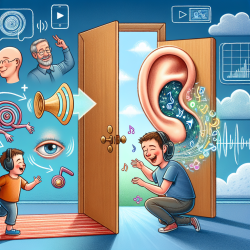Introduction
Understanding the long-term effects of middle ear disease, such as otitis media, on auditory processing in children is crucial for speech-language pathologists. The study titled Long-term effect of middle ear disease on temporal processing and P300 in two different populations of children offers valuable insights into how this condition impacts auditory functions in children from different backgrounds. By examining these findings, practitioners can enhance their skills and improve outcomes for children affected by this common childhood ailment.
Key Findings from the Research
The study investigated the effects of otitis media on temporal processing and P300 responses in Brazilian and Australian children. Key findings include:
- Children with a history of otitis media exhibited poorer performance in temporal processing tests compared to control groups without such a history.
- Both Brazilian and Australian children with otitis media showed delayed P300 latencies, indicating potential deficits in attention and memory functions.
- Brazilian children with otitis media demonstrated significantly poorer performance in temporal processing tests compared to their Australian counterparts, suggesting socio-economic factors may play a role in the severity of auditory deficits.
Implications for Practice
These findings underscore the importance of early identification and intervention for children with a history of otitis media. Speech-language pathologists can implement several strategies to address the challenges posed by this condition:
- Early Screening and Monitoring: Regular auditory screenings for children with a history of otitis media can help detect deficits early, allowing for timely intervention.
- Targeted Auditory Training: Implementing auditory training programs focused on enhancing temporal processing skills can be beneficial for children affected by otitis media.
- Collaborative Care: Working closely with audiologists and other healthcare professionals ensures a comprehensive approach to managing the effects of otitis media.
Encouraging Further Research
While this study provides valuable insights, further research is needed to explore the long-term impacts of otitis media on auditory processing across diverse populations. Practitioners are encouraged to engage in research initiatives that investigate the socio-economic and cultural factors influencing the severity of auditory deficits in children with a history of otitis media.
Conclusion
By leveraging the findings from this study, speech-language pathologists can enhance their practice and contribute to better outcomes for children affected by otitis media. Emphasizing early intervention, targeted training, and collaborative care will ensure that children receive the support they need to thrive despite the challenges posed by this condition.
To read the original research paper, please follow this link: Long-term effect of middle ear disease on temporal processing and P300 in two different populations of children.










